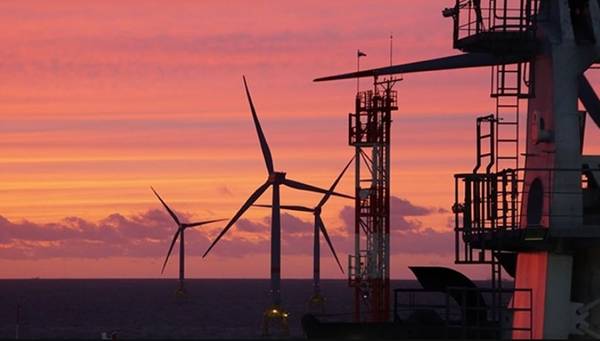
(Credit: Iberdrola)
In a significant advancement for renewable energy in Europe, the Baltic Eagle offshore wind farm has reached full completion and is now operational, as announced by the joint venture partners, Abu Dhabi Future Energy Company (Masdar) and Iberdrola. This landmark project, standing at an impressive capacity of 476 megawatts (MW), marks the inaugural achievement under the strategic collaboration between these two energy leaders and represents a pivotal step in bolstering Germany’s ambitions for a cleaner energy future.
The completion of the Baltic Eagle is not merely an industrial accomplishment; it is emblematic of Germany’s larger commitment to transitioning towards sustainable energy solutions amidst growing concerns over climate change and energy security. With the capacity to provide energy to approximately 475,000 households, the wind farm is expected to mitigate carbon dioxide emissions by an estimated 800,000 tons annually. This initiative resonates with Germany’s Energiewende, or “energy transition,” which aims to significantly increase the share of renewable energy within the nation’s energy mix.
The Baltic Eagle offshore wind farm represents the second of Iberdrola’s three flagship wind farm projects located in German waters. Iberdrola previously launched the Wikinger wind farm, boasting a capacity of 350 MW, which has been operational since 2017. Additionally, the company is planning a third project named Windanker, designed with a capacity of 315 MW, further solidifying its commitment to harnessing wind energy in the Baltic Sea. Collectively, these ventures form what is now known as Iberdrola’s Baltic Hub, positioning the company as a pivotal player in the renewable energy sector not only in Germany but across Europe.
The joint effort between Masdar and Iberdrola is rooted in a shared vision of advancing clean energy technologies and fostering a sustainable future. Masdar, known for its innovation in renewable energy projects, underscores its commitment through collaboration with reputable global partners like Iberdrola. Their alignment illustrates a mutual understanding of the urgency required to combat climate change and highlights the transformative potential of renewable energy investments. Moreover, such partnerships pave the way for knowledge exchange and technological advancements in the renewable energy domain.
Germany’s robust policy framework supporting renewable energy deployment serves as a conducive environment for such projects. Government incentives and regulatory frameworks have laid the groundwork for significant investments in wind energy, making it one of the fastest-growing sectors in the country. As part of its energy policy, Germany aims to generate 80% of its electricity from renewable sources by 2030, a target that necessitates extensive production facilities like Baltic Eagle.
The implications of the Baltic Eagle project extend beyond energy generation. The venture also contributes to local economies through job creation during both the construction and operational phases. The wind farm serves as a testament to the potential economic benefits of renewable energy projects, such as providing stable employment opportunities and fostering regional development. Furthermore, as Europe faces increasing pressures to pivot from fossil fuels, initiatives like Baltic Eagle may inspire similar projects across the continent, promoting a collective shift towards sustainable practices.
In conclusion, the successful completion and energization of the Baltic Eagle offshore wind farm signify not only a technical achievement but also a crucial milestone in the global transition to renewable energy sources. As we stand at the forefront of an impending energy revolution, projects like the Baltic Eagle reaffirm the potential of collaborative efforts between nations and companies in addressing climate change challenges. The future of energy appears increasingly promising, one that emphasizes sustainability, innovation, and international cooperation.
#BusinessNews #EconomyNews #RenewableEnergy #Germany
